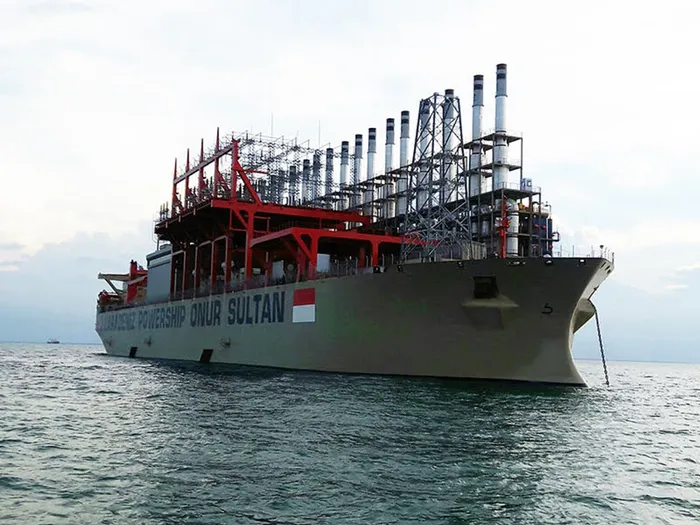Gas projects in South Africa: The legal imperative for compliance

Environmental groups have brought a review against the approval of Karpowership’s floating gas-to-power project in Richards Bay.
Image: Supplied
South Africa is at a crucial point in deciding how electricity will be produced in the years to come. The government has placed growing emphasis on gas as a transitional source of power, bridging the gap between coal and a renewable energy future. These conversations are often highly technical and not easily accessible to the public.
Yet, how energy is produced is a matter of fundamental public interest. It raises questions about whether the law is upheld, whether the environment is safeguarded, and what kind of energy future is being created. Richards Bay has now become a central site in this debate.
Last month, the Supreme Court of Appeal set aside Eskom’s environmental authorisation for a large gas-fired power plant in Richards Bay. The court found that the process did not ensure proper public participation, failed to consider reasonable alternatives, and did not fully assess environmental and climate impacts, including cumulative effects. It held that projects cannot simply be approved because they match government policy. The court also questioned the need for the project given that similar generation capacity had already been allocated to other developers. This judgment makes clear that gas projects must be subject to rigorous legal scrutiny and that affected communities must be given a meaningful chance to participate in decisions that could shape their future.
Two other cases show how courts are continuing to test gas and oil developments. The Constitutional Court recently heard argument in the Shell seismic blasting matter. Communities and environmental organisations are opposing a suspended order of invalidity; which allows Shell to apply again for an exploration right that had already been set aside.
The High Court had ruled that the right was granted unlawfully because affected communities were not properly consulted, and because their food security, cultural rights, and the climate implications were overlooked. The court emphasised that these communities depend on the ocean for food and supporting their livelihoods, and that their spiritual and cultural connections to the sea could not be ignored. The applicants told the Constitutional Court that allowing Shell to renew its rights in this way would perpetuate an illegality and undermine constitutional protections. They argued that a suspension of invalidity creates legal uncertainty and weakens the rights of communities that have already suffered from flawed decision-making processes.
At the same time, environmental groups have brought a review against the approval of Karpowership’s floating gas-to-power project in Richards Bay. This project proposes to moor ships in the harbour for up to twenty years, importing liquefied natural gas, burning it on board to generate electricity, and feeding that power directly into the national grid. The organisations bringing the case argue that the authorisation process was deeply flawed, that the voices of the communities were sidelined, and that important issues such as air quality, climate change, and socio-economic impacts were not adequately addressed. They say that the environmental impact assessment ignored key risks, including greenhouse gas emissions and the long-term effects of mooring large industrial vessels in an ecologically sensitive port. These groups point out that the authorisation was granted in spite of widespread opposition, and that the decision reflects a failure of environmental governance.
These cases are significant because Richards Bay has been identified as a strategic hub for liquefied natural gas imports and gas-to-power projects. The plan is to import gas by ship, convert it back into liquid form through regasification, and then supply it to land-based power stations as well as floating powerships. There are also proposals to construct pipelines to transport gas further inland, which would expand the reach of gas infrastructure across the country. Richards Bay is therefore not just the site of one or two projects, but the starting point of a larger network of gas-related developments.
When all of these projects are considered together, it becomes clear that what is at stake is not a collection of isolated developments but a coordinated expansion of gas infrastructure. Each new power plant, powership, import terminal and pipeline adds to the overall impact on the environment. The combined effects include increased air pollution, higher greenhouse gas emissions, pressure on water resources, disruption of coastal ecosystems, and risks to community health and livelihoods. The law requires decision-makers to take account of these cumulative impacts, not only the effects of each individual project. This principle ensures that the bigger picture is not ignored and that short-term authorisations do not lock the country into long-term environmental harm.
Fortunately, the courts are playing a central role in enforcing these requirements. The legal principle of cumulative impact assessment requires authorities to evaluate the combined effects of all related activities, rather than looking at each project in isolation. The courts have made it clear that this cumulative impact must be assessed as a legal obligation.
In the Eskom case, the judges confirmed that assessing the combined effect of related activities is mandatory under environmental law. In another case, The Green Connection v Minister of Forestry, Fisheries and the Environment, the High Court set aside the environmental authorisation for offshore oil and gas exploration. The court found that the environmental impact assessment (EIA) process had serious shortcomings. It failed to properly address the risks of oil spills and blowouts, even though these carry the potential for significant harm to people and the environment. The decision-makers also failed to apply the Integrated Coastal Management Act, which exists to safeguard coastal public property and the interests of all users. While the assessment considered the possible economic benefits of finding gas, it did not fully account for the negative consequences of burning that gas later on, including the release of greenhouse gas emissions. The court held that both the benefits and the harms must be weighed.
The judges also pointed out that transboundary impacts were not properly assessed, even though domestic law and international agreements require consideration of potential effects on neighbouring countries and international waters. Oil spill contingency plans, which should have been subject to public scrutiny, were also not made available for comment, undermining transparency and meaningful participation.
By setting aside authorisations that fall short of the law, the courts are reminding government and developers that the constitutional rights of communities and the duty to protect the environment cannot be brushed aside in the rush to build new energy projects. They are also signalling that energy planning must take climate change seriously, given South Africa’s obligations under both domestic law and international commitments.
The outcome of these cases will help determine how South Africa balances the urgent need for new electricity supply with the equally pressing need to reduce emissions and protect communities. The decisions will also test whether the country is willing to invest in an energy future that is consistent with the Constitution, or whether it will continue to pursue gas at any cost.

Dr Jonty Cogger, attorney at the Centre for Environmental Rights (CER).
Image: Supplied
Dr Jonty Cogger, attorney at the Centre for Environmental Rights (CER)
*** The views expressed here do not necessarily represent those of Independent Media or IOL.
BUSINESS REPORT